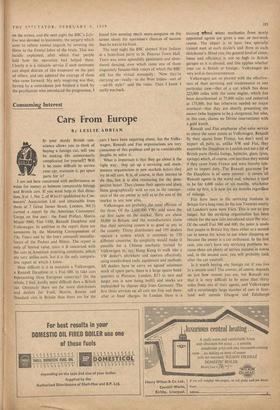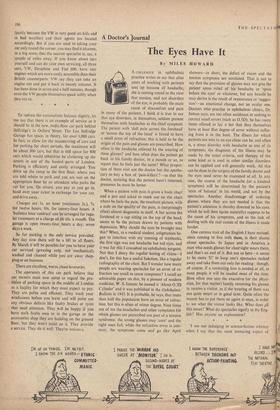Consuming Interest
Cars From Europe
By LESLIE ADRIAN IF your sturdy British con- science allows you to think of buying a foreign car, will you be making life unnecessarily complicated for yourself? Will it be more difficult to service your car, maintain it, get spare parts for it?
I am not here concerned with performance or value for money as between comparable foreign and British cars. If you want help in that direc- tion, Vol. 1, No. 2, of Which? (published by Con- sumers' Association Ltd. and obtainable from them at 7 Great James Street, London, WC1) carried a report by the American Consumers' Union on five ears: the Ford Prefect, Morris Minor 1000, Fiat 1100, Renault Dauphine and Volkswagen. In addition to the report there are comments by the Motoring Correspondent of The Times and by the (very annoyed) manufac- turers of the Prefect and Minor. The report is only of limited value, since it is concerned with the cars in American motoring, conditions, which are very unlike ours, but it is the only compara- tive report of which I know.
How difficult is it to maintain a Volkswagen, a Renault Dauphine or a Fiat 600, to take cars representing three European countries? On the whole, I find, hardly more difficult than a British car. Obviously there are far, more distributors and dealers for Ford, Morris, Rootes and Standard cars in Britain than there are for the cars I have been inquiring about, but the Volks- wagen, Renault and Fiat organiSations are very, conscious of this problem and go to considerable lengths to solve it.
What is important is that they go about it the right way: they set up a servicing and main- tenance organisation in new markets before they try to sell cars. It is, of course, in their interest to do this, but it is also reassuring for the pros- pective buyer. They choose their agents and place them geographically with an eye, to the conveni- ence of the car owner as well as to the size of the market in any new area.
Volkswagen are probably the most efficient of the three. Of the 2,600,000 VWs sold since the car first came on the market, there are about 30,000 in Britain, and the manufacturers claim that their servicing system is as good as any in the country. Thirty distributors and 195 dealers operate a system which is common to 130 different countries. Its simplicity would make it possible for a Chinese mechanic trained by Volkswagen in, say, Hong Kong to walk into a VW dealer's anywhere and operate effectively, using standardised tools, equipment and methods. All dealers have to carry an agreed minimum stock of spare parts, there is a large spares head- quarters at Plaistow, London, EIS (a new and larger one is now being built), and stocks are replenished by charter ship from Germany. The first three services on all cars are free and there- after at fixed charges. In London there is a training fie tool where mechanics from newly appointed agents are given a one- or two-week course. The object is to have two specially trained men at each dealer's and three at each distributor's. Mind you, the general level of clean- liness and etliciency is not so high in British garages as it is abroad, and this applies whether your car is British or foreign : Volkswagen do very well in the circumstances.
Volkswagen are so pleased with the effective- ness of their servicing and maintenance in one particular case—that of a car which has done 225,000 miles with the same engine, which has been decarbonised at 75,000 miles and resleeved at 175,000, but has otherwise needed no major overhaul—that they are shortly presenting the owner (who happens to be a clergyman, but who, in this case, claims no Divine intervention) with a gold watch.
Renault and Fiat emphasise after-sales service to about the same extent as Volkswagen. Renault fly their spares from France, but don't need to import all parts as, unlike VW and Fiat, they assemble the Dauphine in London and use a lot of British parts (brake linings, batteries, glass, tyres, springs) which, of course, cost less than they would if they came from France and were thereby sub- ject to import duty. The Renault guarantee for the Dauphine is of some interest : it covers all Renault agents in the world and, whereas it used to be for 4,000 miles or six months, whichever came up first, it is now for six months regardless of mileage.
Fiat have been in the servicing business in Britain for a long time. In the late Twenties nearly all London's taxis were Fiats. This is not so any longer, but the servicing organisation has been rebuilt for the new cars introduced since the war.
Of the small Fiat 500 and 600, the point is made that people in Britain buy them either as a second car in towns for wives to use when shopping or because the owner is a car enthusiast. In the first case, you can't have any servicing problems be- cause there are plenty of service stations'in towns and, in the second case, you will probably look after the car yourself. .
Is it worth buying any foreign car if you live in a remote area? The answer, of course, depends on just how remote you are, but Renault say that it is very difficult to be more than thirty miles from one of their agents, and Volkswagen sell a surprisingly large number of cars in Scot- land well outside Glasgow and Edinburgh (partly because the VW is very good on hills and in bad weather) and their agents are located accordingly. But if you are used to taking your car only round the corner, you may find it irksome, in a big town, that the nearest specialist is, say, a couple of miles away. If you know about cars yourself and can do your own servicing, all three cars, VW, Dauphine and Fiat 600, have rear engines which are more easily accessible than their British counterparts. VW say they can take an engine out and put it back in twenty minutes. It has been done in seven and a half minutes, though even the VW people themselves speak softly when they say so.
To redress the nationalistic balance slightly, let me say that there is an example of service as it should be in the new, multi-floor car park behind Selfridge's in Oxford Street. The Lex Selfridge Garage has space, in theory, for over 1,000 cars. In fact, to allow for the manoeuvring of cars and for parking for short periods, the maximum will be about 800 cars, but that is still space for 800 cars which would otherwise be cluttering up the streets in one of the busiest parts of London. Parking is efficiently and easily arranged. You drive up the ramp to the first floor, where you are told where to park and you are met on the appropriate floor by an attendant who parks the car for you. On return, you pay as you go in, hand over your ticket in exchange for your car, and drive away.
Charges are Is. an hour (minimum 2s.), 7s. for twelve hours, 10s. for twenty-four hours. A `business hour contract' can be arranged for regu- lar customers at a charge of £6 10s. a month. The garage is open twenty-four hours' a day, seven days a week.
So far parking is the only service provided. Any day now there will be a lift to all 'floors. By March it will be possible for you to have your car serviced (greasing only, not ' mechanical), washed and cleaned while you are'away shop- ping or on business.
There are excellent, warm, clean lavatories.
The operators of this car park believe that car owners. must now come to regard the pro- vision of parking space in the middle of London as a facility for which they must expect to pay. They are polite and efficient.. They wash your windscreen before you leave and will point out any obvious defects like faulty brakes or tyres that need attention. They will be happy if you have such faults seen to in the garage or the accessories shop they are building on the ground floor, but they won't insist on it. They provide a service. They do it well. They're welcome:







































 Previous page
Previous page